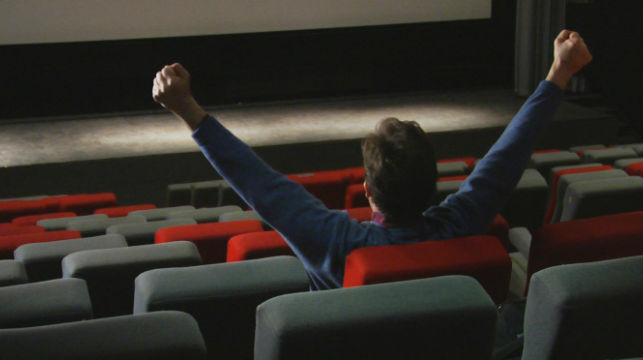Movie Review: To Each His Own Cinema (2007)


To Each His Own Cinema (2007)
Director: Various
Cast: Isabelle Adjani, Pegah Ahangarani, Anouk Aimée
Synopsis: An anthology of 33 short movies in which directors express “their state of mind of the moment as inspired by the motion picture theatre.”
Like us on Facebook
Catch all our reviews on Facebook.
Commissioned for the 60th anniversary of the Cannes Film Festival, To Each His Own Cinema (or Chacun son cinema: une declaration d’amour au grand ecran, to give the film its full French title) is an anthology movie comprised of 33 3-minute movies from some of the world’s finest directors, who were each asked to contribute something that expressed “their state of mind of the moment as inspired by the motion picture theatre.” As you’d expect, such a broad remit prevented any repetition of ideas, and more or less ensured an eclectic collection of mini movies which range from straightforward observations of audiences to surreal battles with dancing lady bugs via political observations on the inescapability and influence of war. In many ways, how each filmmaker chooses to interpret his remit is more interesting than the films they produce, and offers fascinating insights into the way that both individual personalities and national ideologies contribute to such a diverse collection of ideas.
All of the films fit broadly into one of two categories, offering observations on either what it is like to be a member of the audience, or attempting to describe in visual terms the emotional impact a movie can have on us. As is so often the case, simplicity fosters the most perceptive interpretation, which is to be found in Abbas Kiarostomi’s unadorned study of the faces of a number of female audience members as they watch the final scenes of Franco Zeffirelli’s Romeo and Juliet. Nanni Moretti follows a similar theme by filming a middle-aged moviegoer whose enthusiasm for even the less salubrious examples of the medium while recounting his movie-going experiences reflects the simple pleasures to be found in even the most commercial of movies.
As with all anthology movies, the quality is highly variable, and it’s often difficult to remain attentive even when all the movies share a theme. Wong Kar-Wai’s movie is sensual and poetic and a sheer joy to look at; while Michael Cimino’s entry – his final work before his death in 2016 – is lively and energetic, but rather flippant. Roman Polanski sets his movie at a sparsely attended screening of an Emmanuelle movie, during which a middle-aged couple suspect another member of the audience of noisily masturbating. It’s an old joke, but is concluded with an unexpectedly poignant image of shadows dancing within the beam of light projecting images onto the screen – a sight that many of us will never see again in the digital age. The most self-indulgent episode is surely submitted by Egyptian director Youssef Chahine, in which he contrasts the disappointment of having his film overlooked during the 1957 Cannes festival with his sense of triumph at winning a lifetime achievement award at the 2007 one.
(Reviewed 13th October 2016)
httpv://www.youtube.com/watch?v=m8M4r8Uw9vs

0 Comments